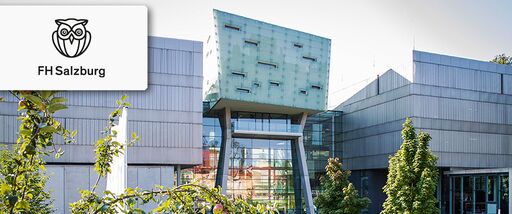School:FH Salzburg
Overview
Even though the Salzburg University of Applied Sciences is a small university, this does not mean that it lacks any kind of potential. Quite the contrary, due to our size different opportunities can be quite easily taken. This includes different classes held by various departments, research and developments projects done for major companies like Skidata, Sony, Daimler, etc., and events like Ludecat (a Indie-Gaming Competition) or the Robothon (a robotics competition, spannign over 24 hours). The Salzburg University of Applied Sciences is divided into two campuses.
Urstein is a larger campus where 33 study courses are offered. In Kuchl you have the choice between 3 study courses. Students receive training in different disciplines of Engineering, Business and Social Sciences comprising Tourism, Business Management and Social Work, Design, Media & Arts and Health Studies. With its international orientation and focus on innovative research and teaching the university is a pioneer for future-oriented courses and practice-oriented solutions for business and society.
Our campus has dedicated its teaching towards innovative ideas. The campus have a StartUp Center as well, where students can take a mentorship to develop their idea into a business model. A startup incubator is settled here and once a year the SEA is taking place (Startup Executive Academy 2018). One major task of the FH Salzburg is to connect graduates with companies directly.
Video: https://www.youtube.com/embed/0xMbK1Ix7WI
Innovation and Entrepreneurship
There are over 100 courses related to Innovation and Entrepreneurship, as well as interdisciplinary courses in all departments where students can gain awareness of this topic. To develop hands-on skills and design thinking mindset, students can work in different on-campus Labs, participate in workshops, and yearly organized Hackathons. Moreover, there is a Startup Center that has the goal: “Salzburg is becoming Austria’s most important startup region – and Salzburg University of Applied Sciences is becoming the most entrepreneur-friendly university in the region.”
In June 2022 the new research building "Twin²Sim" officially opened at the campus Kuchl. With its scientific possibilities, the experimental building not only corresponds to the current state of the art, but is also constructed as an energy-efficient, structural timber building. The aim is to develop solutions for technical building systems, components, building envelopes and multi-functional façades, to test them metrologically in experiments and to develop them further.
Furthermore, the project Retail<ization/> 4.0, which started in 2021, is also researching robotics in retail, smart factories and so much more. The Team Retailization 4.0 is working tirelessly on innovative concepts for the future.
Encouraging faculty innovation and entrepreneurship
"Salzburg University of Applied Sciences has a research revenue totalling approximately 3,5 million euros per year. Approximately 25% of all third-party funding comes from companies, whilst the remaining three quaters comes from a variety of different public funding agencies. The research skills of our researchers are showcased in approximately 100 R&D projects per year and a number of research publications. The university also utilises cutting-edge technology and high-end laboratory equipment to create a modern, efficient research infrastructure. All of these factors make Salzburg University of Applied Sciences an innovative research and co-operation partner for regional, national and – increasingly – international companies."
(https://www.fh-salzburg.ac.at/en/research/research-and-development)
Collaboration between university and industry
"There are many interfaces to business: experts from companies teach at the Salzburg University of Applied Sciences, students write theses for and with companies, research projects are developed in cooperation with business, and seminars deal with questions from companies. This practical relevance enables students to apply the theoretical knowledge they have acquired in various projects. Companies have the advantage that problems are illuminated and dealt with and the results can be integrated into their business processes." (https://www.fh-salzburg.ac.at/en/about-fh-salzburg/about-us/cooperations-with-companies)
Students not only get to work on real-life projects that the companies provide them with - there is also an agreement (study.work.support) between numerous companies and the university which makes it possible for students to easily get part-time positions at those partner companies to gain experience relevant to their studies, where they can test out what they learnt and improve their skills through something more tangible than homework.
Actively supporting the university technology transfer function
Facilitating university-industry collaboration: "The Research Coordination Office acts as the linchpin for Salzburg University of Applied Sciences’ varied research agendas and works closely with SUAS researchers, university services and university management, to which it also reports to. The office provides general support on research funding, research documentation and research communication." (https://www.fh-salzburg.ac.at/en/research-development/research-development/research-coordination-office/?null=&cHash=44c8160759216b5051f621229f4b8a93)
Engaging with regional and local economic development efforts
Once a year we have the “CONTACTA” fair. It connects local businesses with alumni and interns. (https://www.fh-salzburg.ac.at/en/partner/career-center/job-and-recruiting-fair-contacta/). Furthermore, a Digital Transfer Centrum was implemented in 2018. Several workshops for companies in the region are held there. Additionally, conferences for SMEs and on topics like new business models are offered.
Link for Partnership: https://www.fh-salzburg.ac.at/en/services/alumni-network/sponsors-and-partners
Links
Change Story Video 2021: https://www.youtube.com/watch?v=7xMb4d49xZ4&ab
Change Story Video 2019: https://www.youtube.com/watch?v=PjBZrBfgiOw
Colleagues
Leadership Circle 2023:
Hanna Christina Trenkler: Fellow:Hanna Christina Trenkler
Leadership Circle 2022:
Daria Kolosovskaia: Fellow:Daria Kolosovskaia — University Innovation Fellows
Konstantin Kowarsch: Fellow:Konstantin Kowarsch — University Innovation Fellows
Lena Pattis: Fellow:Lena Pattis — University Innovation Fellows
Elias Reich: Fellow:Elias Reich — University Innovation Fellows
Lukas Stitz: Fellow:Lukas Stitz — University Innovation Fellows
Nina Stojaković: Fellow:Nina Stojaković — University Innovation Fellows
Christian Weiß: Fellow:Christian Weiß — University Innovation Fellows
Leadership Circle 2021:
Amelie Arrer: https://universityinnovation.org/wiki/Fellow:Amelie_Arrer
Sophie Marie Frohnwieser: https://universityinnovation.org/wiki/Fellow:Sophie_Marie_Frohnwieser
Helen Hinrichs: https://universityinnovation.org/wiki/Fellow:Helen_Hinrichs
Janette Kaspar: https://universityinnovation.org/wiki/Fellow:Janette_Kaspar
Lars Kähler: https://universityinnovation.org/wiki/Fellow:Lars_K%C3%A4hler
Benedikt Matysek: https://universityinnovation.org/wiki/Fellow:Benedikt_Matysek
Julian Nöbauer: https://universityinnovation.org/wiki/Fellow:Julian_N%C3%B6bauer
Benjamin Typplt: https://universityinnovation.org/wiki/Fellow:Benjamin_Typplt
Johanna Wicht: https://universityinnovation.org/wiki/Fellow:Johanna_Wicht
Julia Armstorfer: https://universityinnovation.org/wiki/Fellow:Julia_Armstorfer
Lionel Asshauer: https://universityinnovation.org/wiki/Fellow:Lionel_Asshauer
Andreas Golser: https://universityinnovation.org/wiki/Fellow:Andreas_Golser
Heiko Lehrer: https://universityinnovation.org/wiki/Fellow:Heiko_Lehrer
Leadership Circle 2019
Nora Bendl: http://universityinnovation.org/wiki/Nora_Bendl
Julia Brunhuber: http://universityinnovation.org/wiki/Julia_Brunhuber
Cosima Decho: http://universityinnovation.org/wiki/Cosima_Decho
Christiane Koch: http://universityinnovation.org/wiki/Christiane_Koch
Eva-Maria Kremser: http://universityinnovation.org/wiki/Eva-Maria_kremser
Maximilian Lugmair: http://universityinnovation.org/wiki/Maximilian_lugmair
David Pollhammer: http://universityinnovation.org/wiki/David_Pollhammer
Leadership Circle 2018:
Lara Goritschnig: http://universityinnovation.org/wiki/Lara_Goritschnig
Dominik Hofer: http://universityinnovation.org/wiki/User:DPHofer
Vanessa Radunz: http://universityinnovation.org/wiki/User:Nessi1998
Patrick Schmid: http://universityinnovation.org/wiki/User:Schmpatr
Related links
